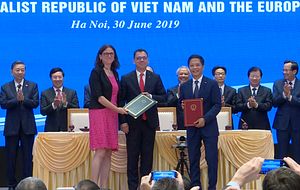Last week, the EU Committee on International Trade approved the Free Trade Agreement with Vietnam by voting outcome with 29 votes for, six votes against, and five abstentions. The Investment Protection Agreement with Vietnam was also adopted by 26 votes for, seven votes against, and six abstentions.
The agreements will then be submitted to the EU Parliament’s voting next month. The trade agreement will be enforced once the Council concludes, but it will take longer for the investment protection agreement enter into force because each member states first need to ratify it.
There is no doubt the Free Trade Agreement, if entered into force next month, has significant advantages and implications. At the most basic level, this will be in terms of increasing and supporting jobs and growth between Vietnam and the EU. The agreements will be beneficial for both sides because it will gradually reduce most tariffs, regulatory barriers, as well as red tape. Furthermore, these would help open up services and public procurement markets as well.
For Vietnam, there are tangible economic and strategic gains. In Vietnam, it is estimated that these agreements would help Vietnam’s GDP increase by 4.6 percent and export to the EU by 42.7 percent by 2025. There is no doubt that this is a good opportunity for Vietnam to access goods markets, services, investments and sustainable development in the world’s largest market. This will also boost Vietnam’s continuous economic growth and step up its global economic integration.
Strategically, Vietnam is the second country after Singapore to sign trade and investment agreements with the EU. Signing these agreements with the EU is a big stepping stone for Vietnam to integrate into the international community this year. These are the most comprehensive partnership and agreements between the EU and Vietnam with a wide range of commitments from economic, trade, investment, to sustainable development issues.
Meanwhile, the EU achieve a long-term goal to widen its influence and expansion in the ASEAN markets by targeting Vietnam. Vietnam’s economy is one of the fastest growing in Asia, enjoying growth rate of between 5 and 7 percent for nearly 20 years.
EU companies will have opportunity to bid for contracts with Vietnamese ministries and state-owned enterprises throughout the country. The EU Commission estimates the Agreements would help exports to Vietnam increase by 29 percent in 2035 and increase its GDP to $29.5 billion.
But the agreement is not without its challenges. Most notably, Vietnam needs to abide with the EU on climate, labor, and human rights issues amid a worsening human rights situation in Vietnam. For years, human rights concerns have been at the center of the EU’s concerns about Vietnam.
It is expected the agreements will be ratified and entered into force soon. And while it is clear that this is a win-win situation for both sides, once it enters into force and we begin implementation, the spotlight will shift to how potential gains and losses translate into reality for both sides, and who might win more.
Thoi Nguyen is a member of Chatham House and a member of Amnesty International UK.

































